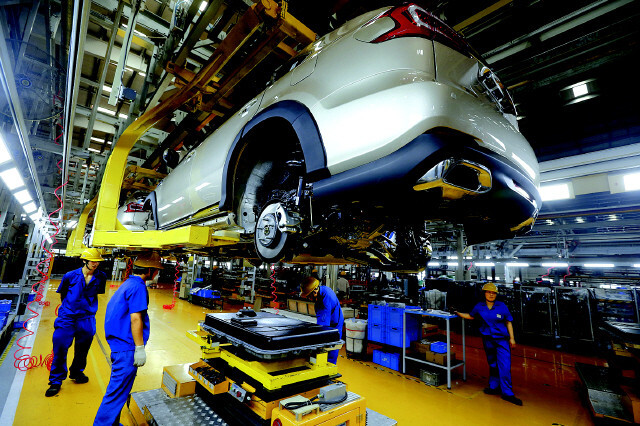hankyoreh
Links to other country sites 다른 나라 사이트 링크
S. Korea suffering severe technological brain drain to China in batteries, semiconductors

Major areas of South Korea’s technology sector, including batteries and semiconductors, are experiencing a severe talent drain to China, a report shows. Industry observers are calling for government countermeasures to stanch the losses.
According to a Korea International Trade Association (KITA) report titled “China: Analysis of the Human Resource Black Hole/Human Resource Drain to China” published on Dec. 3, South Korea ranked 43rd out of 63 countries examined in terms of its “brain drain index,” scoring 4.00 points out of a maximum of 10. South Korea has consistently ranked in the 40s since the study began in 2014. The brain drain index is a measurement tool developed by the International Institute for Management Development in Switzerland, with lower scores out of 10 points indicating a more severe overseas drain situation. Major technology powers ranked high on the index as of last year, including the US in sixth place, Germany in ninth, and Hong Kong in 12th.
According to the report, China -- the country where a large portion of South Korean resources are going -- is courting talented South Koreans through tactics that border on “plundering.” Since launching its “Made in China 2025” industry advancement strategy in 2015, the Chinese government has been actively working to attract overseas talent, with companies wooing talented South Koreans with exceptional benefit packages.
The report named batteries, semiconductors, and aviation as areas where the brain drain has been particularly acute. In the area of batteries -- which many companies are developing as a future revenue source amid rapid growth in the global market – China’s globally top-ranked CATL offered annual salaries of around 300 million won (US$251,120) after taxes for a department director-level position during large-scale hiring last July. BYD, China’s leading electric vehicle company, hired South Korean battery employees in 2017 with packages that included bonuses, a vehicle, and accommodations on top of their annual pay. Hengda, China’s biggest real estate group, announced preferential treatment for individuals with histories of working in automobile powers such as South Korea, Japan, and Germany when it hired around 8,000 global employees for a new-energy vehicle company established early this year.
“Having begun their global market expansion in earnest, China’s battery companies are going all out to acquire talented employees, and South Koreans are among their targets,” the report said.
“In particular, they are taking advantage of the confusion at LG Chem and SK Innovation -- which are currently in a legal battle over core technology infringements and human resource drains -- to target highly competitive South Korean professionals,” it noted.
In the semiconductor industry, Fujian Jinhua Integrated Circuit Company (JHICC) published a hiring notice this past April announcing a “preference for those who have worked as engineers at Samsung Electronics or SK Hynix for 10 or more years” -- an overt signal that it is attempting to poach talented employees. The area of aviation was the first to experience an overseas drain among pilots and other workers, with around 460 South Korean pilots transferring to foreign airlines between 2014 and July 2019; at least 367 of them, or 80%, were counted as having gone to work for Chinese airlines.
“To circumvent provisions barring re-employment at a similar company, Chinese business have been employing South Korean workers at affiliates or companies they have invested in, which has made it impossible to properly gauge the semiconductor brain drain statistically,” the report observed.
The report warned that the “loss of high-level workers in the battery and semiconductors industries could weaken technological competitiveness and give rise to issues of reduced safety and difficulties establishing new routes in the aviation industry.”
“Long-term policy support will be needed to prevent human resource losses and attract human resources,” it advised.
By Kim Eun-hyoung, staff reporter
Please direct comments or questions to [english@hani.co.kr]

Editorial・opinion
![[Editorial] Penalties for airing allegations against Korea’s first lady endanger free press [Editorial] Penalties for airing allegations against Korea’s first lady endanger free press](https://flexible.img.hani.co.kr/flexible/normal/500/300/imgdb/original/2024/0502/1817146398095106.jpg) [Editorial] Penalties for airing allegations against Korea’s first lady endanger free press
[Editorial] Penalties for airing allegations against Korea’s first lady endanger free press![[Editorial] Yoon must halt procurement of SM-3 interceptor missiles [Editorial] Yoon must halt procurement of SM-3 interceptor missiles](https://flexible.img.hani.co.kr/flexible/normal/500/300/imgdb/child/2024/0501/17145495551605_1717145495195344.jpg) [Editorial] Yoon must halt procurement of SM-3 interceptor missiles
[Editorial] Yoon must halt procurement of SM-3 interceptor missiles- [Guest essay] Maybe Korea’s rapid population decline is an opportunity, not a crisis
- [Column] Can Yoon steer diplomacy with Russia, China back on track?
- [Column] Season 2 of special prosecutor probe may be coming to Korea soon
- [Column] Park Geun-hye déjà vu in Yoon Suk-yeol
- [Editorial] New weight of N. Korea’s nuclear threats makes dialogue all the more urgent
- [Guest essay] The real reason Korea’s new right wants to dub Rhee a founding father
- [Column] ‘Choson’: Is it time we start referring to N. Korea in its own terms?
- [Editorial] Japan’s rewriting of history with Korea has gone too far
Most viewed articles
- 1[Editorial] Penalties for airing allegations against Korea’s first lady endanger free press
- 260% of young Koreans see no need to have kids after marriage
- 3Months and months of overdue wages are pushing migrant workers in Korea into debt
- 4Bills for Itaewon crush inquiry, special counsel probe into Marine’s death pass National Assembly
- 51 in 3 S. Korean security experts support nuclear armament, CSIS finds
- 6[Guest essay] Maybe Korea’s rapid population decline is an opportunity, not a crisis
- 7[Reporter’s notebook] In Min’s world, she’s the artist — and NewJeans is her art
- 8[Editorial] Yoon must halt procurement of SM-3 interceptor missiles
- 9S. Korea discusses participation in defense development with AUKUS alliance
- 10Cracks found in containment building of UAE nuclear power plant built by S. Korean companies